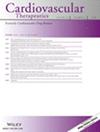Advanced Glycation End Product Blocker Drugs Have a Great Potential to Prevent Diabetic Cardiomyopathy in an Animal Model of Diabetes Mellitus Type-2
IF 3.4
4区 医学
Q2 CARDIAC & CARDIOVASCULAR SYSTEMS
引用次数: 2
Abstract
Introduction Sphingosine 1 phosphate (S1P) is a product of the sphingosine kinase 1 (SphK1) enzyme. Increased S1P can lead to tissue fibrosis that is also one of the pathways for developing diabetic cardiomyopathy. Advanced glycation end products (AGEs) increase S1P in cells. The study is aimed at using aminoguanidine (AG) as an AGEs blocker drug to prevent diabetic cardiomyopathy. Materials and methods. 210 rats were enrolled in the study. Diabetes mellitus type-2 was induced, and rats were divided into AG treated diabetic and nondiabetic groups. The heart histology was assessed with Masson's trichrome and hematoxylin-eosin staining. Cardiac function was measured with transthoracic echocardiography. S1P level and SphK1 gene expression were measured by western-blot and RT-qPCR, respectively. Results Results showed that S1P level increases in diabetes, and its augmentation in cardiac tissue with K6PC-5 leads to cardiac fibrosis. 50 and 200 mg/kg of AG prevented cardiac fibrosis, but 100 mg/kg had no significant preventive effect. AG suppressed the SphK1 gene expression and reduced the fibrotic effect of S1P. AG preserved cardiac function by keeping ejection fraction and fractional shortening within the normal range in diabetic rats. Conclusion AG has a suppressor effect on SphK1 gene expression besides its AGEs blocker role. AG is a potential drug to use in diabetic patients for preventing the development of diabetic cardiomyopathy. Other drugs that have AGEs or S1P blocker effects are a good choice for diabetic cardiomyopathy prevention.晚期糖基化终产物阻滞剂在2型糖尿病动物模型中预防糖尿病性心肌病有很大的潜力
鞘氨醇1磷酸(S1P)是鞘氨醇激酶1(SphK1)酶的产物。S1P升高可导致组织纤维化,这也是发展为糖尿病心肌病的途径之一。晚期糖基化终产物(AGEs)可增加细胞中的S1P。本研究旨在使用氨基胍(AG)作为AGEs阻断剂预防糖尿病心肌病。材料和方法。210只大鼠被纳入研究。诱导2型糖尿病,并将大鼠分为AG治疗的糖尿病组和非糖尿病组。用Masson三色染色和苏木精-伊红染色评估心脏组织学。采用经胸超声心动图测定心功能。通过蛋白质印迹和RT-qPCR分别测定S1P水平和SphK1基因表达。结果糖尿病患者血清S1P水平升高,K6PC-5可引起心肌纤维化。50和200 mg/kg AG可预防心脏纤维化,但100 mg/kg无明显预防作用。AG抑制SphK1基因的表达并降低S1P的纤维化作用。AG通过将糖尿病大鼠的射血分数和缩短分数保持在正常范围内来保持心脏功能。结论AG除了具有AGEs阻断作用外,还具有抑制SphK1基因表达的作用。AG是一种潜在的药物,可用于糖尿病患者预防糖尿病心肌病的发展。其他具有AGEs或S1P阻滞剂作用的药物是预防糖尿病心肌病的好选择。
本文章由计算机程序翻译,如有差异,请以英文原文为准。
求助全文
约1分钟内获得全文
求助全文
来源期刊

Cardiovascular Therapeutics
医学-心血管系统
CiteScore
5.60
自引率
0.00%
发文量
55
审稿时长
6 months
期刊介绍:
Cardiovascular Therapeutics (formerly Cardiovascular Drug Reviews) is a peer-reviewed, Open Access journal that publishes original research and review articles focusing on cardiovascular and clinical pharmacology, as well as clinical trials of new cardiovascular therapies. Articles on translational research, pharmacogenomics and personalized medicine, device, gene and cell therapies, and pharmacoepidemiology are also encouraged.
Subject areas include (but are by no means limited to):
Acute coronary syndrome
Arrhythmias
Atherosclerosis
Basic cardiac electrophysiology
Cardiac catheterization
Cardiac remodeling
Coagulation and thrombosis
Diabetic cardiovascular disease
Heart failure (systolic HF, HFrEF, diastolic HF, HFpEF)
Hyperlipidemia
Hypertension
Ischemic heart disease
Vascular biology
Ventricular assist devices
Molecular cardio-biology
Myocardial regeneration
Lipoprotein metabolism
Radial artery access
Percutaneous coronary intervention
Transcatheter aortic and mitral valve replacement.
 求助内容:
求助内容: 应助结果提醒方式:
应助结果提醒方式:


